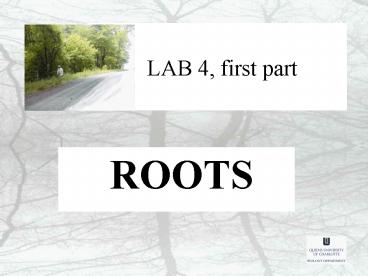LAB 4, first part - PowerPoint PPT Presentation
1 / 20
Title:
LAB 4, first part
Description:
Endodermis with waxy Casparian strips for controlling sap quality ... cells in the endodermis have Casparian strips of waxy, impermeable secretions. ... – PowerPoint PPT presentation
Number of Views:48
Avg rating:3.0/5.0
Title: LAB 4, first part
1
LAB 4, first part
- ROOTS
2
ROOT UNIQUE CHARCTERISTICS
- Stele vascular cylinder central vein
- Root hairs (only on very young roots)
- Endodermis with waxy Casparian strips for
controlling sap quality - Pericycle for making branch roots and wood
3
In all herbaceous roots the endodermis d is the
innermost layer of the cortex e.
4
- The spaces between the compact parenchyma cells
in the endodermis have Casparian strips of waxy,
impermeable secretions. The Casparian strips
prevent any movement of molecules between the
cortex and the vascular tissue UNLESS the
molecules go through (not around) the cell
membranes of the endodermal cells.
5
U Wisc
6
symplast, the cytoplasm which may connect to
other cells by plasmodesmata gap junctions.
- Once a material gets through a membrane, it is
within the plants symplast - You recall, of course, that cell membranes
control the entry and exit of materials in cells
7
APOPLAST the part of tissue which is NOT
protected by membranes
- When a material is in a cell wall or within a
dead cell (like xylem and schlerenchyma), it can
diffuse freely without crossing membranes through
the apoplast, non-cytoplasmic areas throughout
the plant. - Like coffee soaking up through a paper napkin
8
- Notice that the
endodermis
separates the root epidermal
and cortex apoplast from the
apoplast of the rest of the plant. Thus, the
endodermis is modified to control the entry of
materials absorbed by the root hairs before the
vascular tissue transports them to the rest of
the plant sometimes it can keep harmful
substances in the soil out of the rest of the
plant. The endodermis also prevents valuable
materials from phloem sap from - oozing out into the dirt.
9
- The root epidermal and cortex apoplast are
separated from the apoplast of the rest of the
plant. The Casparian strips of the endoderm
separate the two apoplasts. - The only connection between the vascular tissue
and the outer root is the SYMPLAST. - Nothing gets into the symplast unless it goes
through a cell membrane.
10
http//www.sciencemag.org/cgi/content/full/280/53
71/1906
- Ion flow from soil to leaf. After initial
diffusion into the root cell (apoplastic) wall
space (A), the ion is transported across the
outer cell membrane or plasma membrane into the
cytoplasm of an epidermal or cortical cell (B).
(Several layers of cortical cells are represented
by only one.) Once in the cytoplasm the ion moves
through intercellular connections or
plasmodesmata (C) into a cell of the stele and
then leaves the "symplast" across the plasma
membrane of a stelar cell (D) and enters a
vessel, which is, when mature, extracellular or
apoplastic space. (Diffusion through cell wall
space back into the medium is prevented by the
impermeable "Casparian strip.") The ion then
moves into the shoot (E) and eventually is
transported across the plasma membrane of, this
time, a leaf cell (F) into its cytoplasm.
11
The pericycle b is a meristem which produces
branch roots
12
U Wisc
13
(No Transcript)
14
U Wisc
15
Root or stem? Monocot or dicot?
16
dicot roots have a few xylem spokes
- Like a star with3 or 4 or 5 or 6points
- and xylem fills the entire star area.
- Phloem is inpatches between
17
Monocots have multiple xylem spokes
- Monocots have
- special stars
- like Moravians.
- The middle of the
- xylem star
- does not mature.
18
Monocot phloem, like dicot phloem, is in patches
between xylem star points.
19
Monocot or dicot?
20
Next class is Wednesday
- wood background in morning
- lab roots wood
- party next Friday































